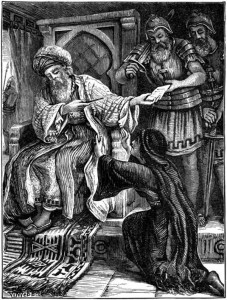Luke 18:9-14
This text is used for the Lectionary Year C on October 23rd, 2016.

In this parable, we see that Jesus is teaching about trust and humility. The contrast that is set up is between a Pharisee, who we can assume is among the crowd who “were confident of their own righteousness and looked down on everybody else” and the tax collector who “would not even look up to heaven, but beat his bread and said, ‘God, have mercy on me, a sinner.’” What sticks out is that we have one character who the crowds may look to for spiritual direction when it comes to how we are to approach God in prayer, while the other is a character who is likely not regarded as a “great person” among the crowd but approaches God with a humble and honest heart. Right away, we see areas for fruitful reflection on the differences in these two characters and the heart that Jesus is interested in for people that desire to be in fellowship with God.
It’s the Pharisee who has followed the rules and done everything that was asked of him. He has established himself as an honest man and knows that society likely sees him as a good person. Tax collectors, on the other hand, may likely be lumped into the category that the Pharisee says he is not – robber, evildoer. He’s probably seen as a leech and traitor for working with Rome at the time and being a burden on the people who are barely scraping by to feed their families. So with this parable, what do we learn about what God finds commendable in a person’s actions? What sort of qualities might the world acclaim that establishes a person as “good” in the eyes of society?



